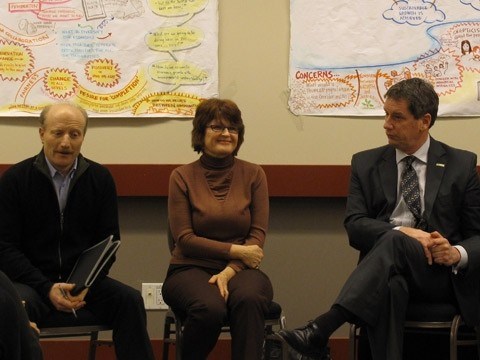With approximately 50 cents of every tax dollar going to health care, and health care increasing its share of the provincial budget, the system is not sustainable in the long term.
But the issue has yet to be addressed - in B.C. or elsewhere in Canada - as politicians weigh the short-term political benefits of inaction against the long-term pain of overhauling a health care system that will eventually fall apart if nothing is done.
This yin and yang of short-term vs. long-term political leadership was on the agenda last week as MLA Joan McIntyre and Mayors Ken Melamed of Whistler, Jordan Sturdy of Pemberton and Greg Gardner of Squamish took part in a Whistler Forum discussion on political leadership - for the next election or the next generation. The Jan. 6 discussion drew about 35 people to the Whistler Conference Centre.
The forum brought out the human side of the corridor's three mayors and MLA, a side unseen by many members of the public whose connection to politics is often highlighted in emotional, personal issues of the moment, and in between marked by blissful ignorance of other issues.
This was a point several of the panelists mentioned.
"This is a public process but often people aren't aware of an issue until it's nearly done," McIntyre said.
"Once emotion enters the argument (it) becomes very difficult."
Melamed said the London Drugs proposal for Whistler Village, which dragged on for nearly two and a half years, might be the only issue in Whistler when people haven't stood up and said, "You didn't ask me."
"We often hear from people, but they're not necessarily in the majority," Melamed added.
Gardner, citing official community plans as an example, said: "I don't think we (politicians) are the ones deciding these things. The public has an important role."
Melamed suggested British Columbia has been "very progressive in looking long term." He noted that local governments are required to produce five-year financial plans, regional growth strategies and schedules for reducing carbon footprints that must be included in community plans.
Those requirements contrast with the "instant gratification" that much of society seeks, Melamed said.
"To make long-term visions come true, you have to satisfy people's short-term goals," Melamed said.
He used logging in the Cheakamus Community Forest as an example of short-term discomfort for long-term vision. He also pointed to public sector wages, which don't react to the market as quickly as private sector wages.
"A couple of years ago it was hard to attract people, businesses had to offer bonuses or incentives. We couldn't do that," Melamed said. "Our staff didn't get those bonuses."
The contract now in place was an example of long-term thinking by the municipality, Melamed said.
"Part of it is having motivated, functioning staff."
Sturdy asked of the forum's starting point: "Is it synthesizing public thoughts or is it having a long-term vision and sticking to it?
"It's a bit of both."
He pointed out that local governments are "more independent thinking" than senior governments that are encumbered by party politics, factions and lobby groups.
Sturdy said one of the main challenges is communication.
"Every time I've got into trouble it's through not communicating properly," he said.
"We can never communicate enough," McIntyre added.
Sturdy said knowing why you think what you think is important for politicians and leaders.
"Defending your position is important. Have a vision, then (it's) learning, listening and leading."
The panel was asked about values they see in leaders and who their mentors were.
Gardner, who said his father - also a mayor and a lawyer - was one of his mentors, described leadership as "leading people, bringing people along with you.
"It involves taking big steps forward, and you can't do that unless you bring people along," he said.
Sturdy said his mother was someone he learned from, in particular her resilience in facing challenges.
"You need to be a critical thinker and look for creative solutions," Sturdy said.
He added that a political leader, particularly in local government, is different than being a business leader. He described business leadership as "an enlightened dictatorship." That's not the way it is on a local council, where each politician has one vote.
Melamed said he entered local politics "not knowing a lot. I pounded my fist on the table when I started."
He learned from former Chief Administrative Officer Jim Godfrey who "never showed what he was really thinking when he wrote a letter to the province. I'd always throw in comments; I've learned to leave them out."
Melamed also had to learn that every decision council makes sets a precedent and holds consequences. Knowing that now, he said it was important to look elsewhere for examples to learn from.
"It's a continuous challenge to go outside and look at issues from other perspectives," he said.
McIntyre said her father - "who tried to talk me out of this job" - was one of her mentors.
"Your name, your integrity - you only have those once," she said.
"You have to live with yourself, live with your decisions."
Summing up the short-term, long-term conundrum in politics, the panel was asked how they personally get satisfaction from decisions they make when the results may not be seen until after they're out of office.
"Over the last couple of years I've done more soul searching than ever before," Melamed said.
"I continue to go abroad to speak, even though I've been criticized for it. It's third-party affirmation. You need test eyes, both internal and external."
Gardner noted that he'd been mayor for two years and he's attended ribbon cuttings for projects that were started before he was elected.
"Third-party reaffirmation is important," Gardner said.
"We got into politics to fix problems."




